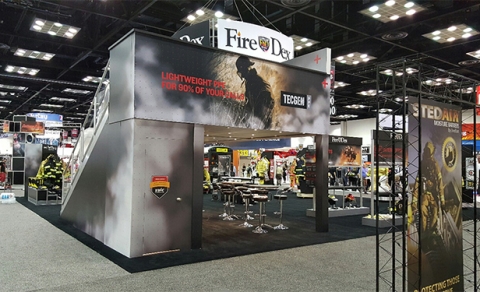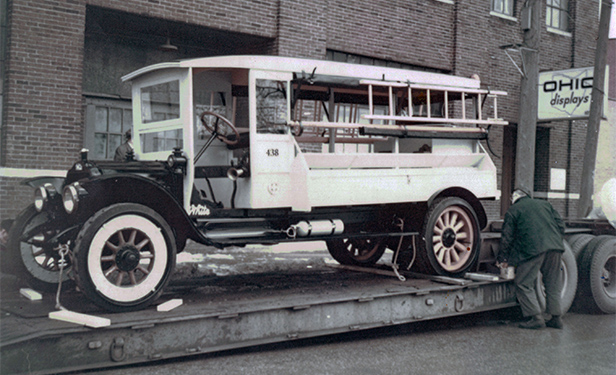How Exhibit Company Ohio Displays Has Survived 2 Pandemics and 5 Wars

Five score and two years ago, Frank Addis founded Ohio Displays Incorporated, which notably created early signs for Cleveland’s original Home and Flower Show — a precursor to modern trade shows.
The company, based in Elyria, Ohio, has lasted long enough to come full circle. Way back in 1919, when Addis launched the business, the country was mired in a health crisis we now know as the Spanish Flu. So in 2021, overcoming a little thing like COVID-19 is old hat.
“We’re in our second pandemic and the doors are still open,” said Bob Miller, ODI’s senior vice president and Addis’ great grandson.
Always Evolving
Miller has few doubts that the company will make it through COVID-19. Staff size is lower than it used to be but key employees remain and work has resumed on building trade show booths to be displayed later this year. In the meantime, Ohio Displays expanded its repertoire to provide valuable marketing assistance to longtime clients even as shows didn’t go on or went completely virtual.
It’s all in more than a century’s worth of survival. Beyond the pandemics, the company has outlasted five wars, two depressions and multiple recessions.
 “We didn’t overcome hurdles over the past 102 years by remaining status quo,” Miller said.
“We didn’t overcome hurdles over the past 102 years by remaining status quo,” Miller said.
He credits his staff’s hard work and positive attitude, including doing the “little things” for clients for the continued success.
At its core, Ohio Displays is a well-respected and (obviously) long-standing designer of trade show exhibits. Clients include the old Ohio Bell telephone company and Republic Steel. Miller and company describe working relationships in decades even as the services have extended beyond state lines.
ODI sells products and also trust, Miller explained. “When people ask me what I do for a living, I say my job is to keep Murphy’s Law away from my clients,” he said.
Growth Strategy
As the clients keep growing, so does Ohio Displays. In the early 2000s, it bought three local exhibit companies. Prior to the merger, the groups were “friendly competition” who Miller remembers getting to know as a child of the industry. In 2015, ODI merged with Alexis Exhibits to further add to its customers and offerings.
ODI’s all-in-one services expanded last year when there were no trade shows. Instead, Ohio Displays became de facto marketing experts — creating content and social media material for clients looking to stay connected with their business community. He predicted that one off-shoot of the pandemic is that more exhibitors will take the time to create Facebook and Instagram posts prior to a show to build excitement for their booth.
ODI is already building exhibits for the fall, with modifications reflective of the pandemic. Clients are being offered slightly bigger spaces to ease traffic flow, encourage social distancing and fill in any potential empty slots, Miller said. Promotional masks with company logos are going to be the most prevalent giveaway items, he added.
“Trade shows are going to come back slow, but stronger than ever,” Miller said. “We’ve learned virtual trade shows are nice filler but not a replacement for a [live] show.”
Don’t miss any event-related news: Sign up for our weekly e-newsletter HERE and engage with us on Twitter, Facebook, LinkedIn and Instagram!


Add new comment